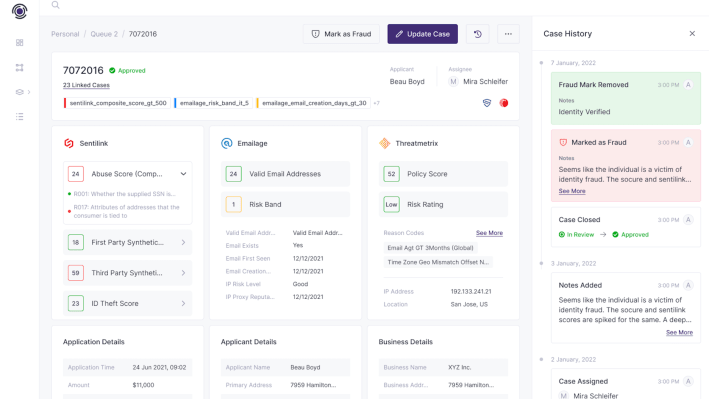We have the power to transfer money to anyone, from anywhere, without having to step foot in a bank branch. And with great power comes great responsibility amid bank transfer or payment fraud amounting to $1.6 billion in 2022.
Ravi Sandepudi, co-founder and CEO of Effectiv, told TechCrunch that now that banks can’t rely on seeing people in-person, there is heavy digitization that requires fraud checks to be done in real time. In addition, also take into account that fraudsters are getting smarter, in part, thanks to generative AI used to simulate people, signatures and voices.
“So many banks were getting hit by fraud and scaling back their digitization channels,” Sandepudi said. “You have five seconds to settle a transaction, where it used to take three to four days with Automated Clearing House (ACH). Even after the money moves, you could pull it back to ACH. Now with one-way payments, once it’s gone, it’s gone.”

Effectiv’s co-founders, clockwise from top left, Ravi Sandepudi, Jonathan Doering, Anupam Tarsauliya and Ritesh Arora. Image Credits: Effectiv
To combat this, Sandepudi teamed up with Anupam Tarsauliya, Jonathan Doering and Ritesh Arora to start Effectiv, a real-time fraud and risk management platform for financial institutions and fintech companies. All of them met at Simility, a fraud detection software company that was acquired by PayPal in 2018.
The San Francisco-based company developed AI-driven tools, including payment fraud detection, customer and business onboarding verification and compliance management, and models that are trained to detect that simulated behavior.
It does this in two ways: one to identify if the behavior is normal — for example, the time of day, the device being used, how it is being held, the transaction amount. Then Effectiv applies an anomaly score to that behavior so that the user can tell which ones need to be scrutinized further. Second, the company creates a model that is trained on loan fraud patterns compared to the anomaly. All of this is done in milliseconds.
The concept has caught on. Since launching in 2022, the company has amassed a list of 15 financial institutions and fintech clients that includes BHG Money, Cardless, Pomelo, USALLIANCE Financial and Peapack-Gladstone Bank. Effectiv processed over $30 billion in financial products in the past year and is currently processing over $100 million each day.
During that same time, the company grew from 15 to 25 people and crossed $1 million in annual recurring revenue. Sandepudi expects to 3x that revenue by the end of the year.
Today, Effectiv joins companies like Cable, also automating bank fraud, in attracting venture capital. The company raised an additional $4.5 million in seed funding to bring its total raise to over $9 million. Better Tomorrow Ventures led the round and was joined by Accel, which led Effectiv’s pre-seed round in 2021, and a group of angel investors.
Sandepudi intends to use the new funding on product development. Now that the instant payment service FedNow is live in the U.S., Effectiv is releasing DeviceAI, a new device biometrics technology that analyzes and flags suspicious user behavior on a device.
“We are well funded now and have a good two-and-a-half years’ worth of runway left,” he said. “If we are able to hit our goal of tripling our revenue, it would make sense to put some fire behind our growth and be more aggressive in acquiring new customers.”
